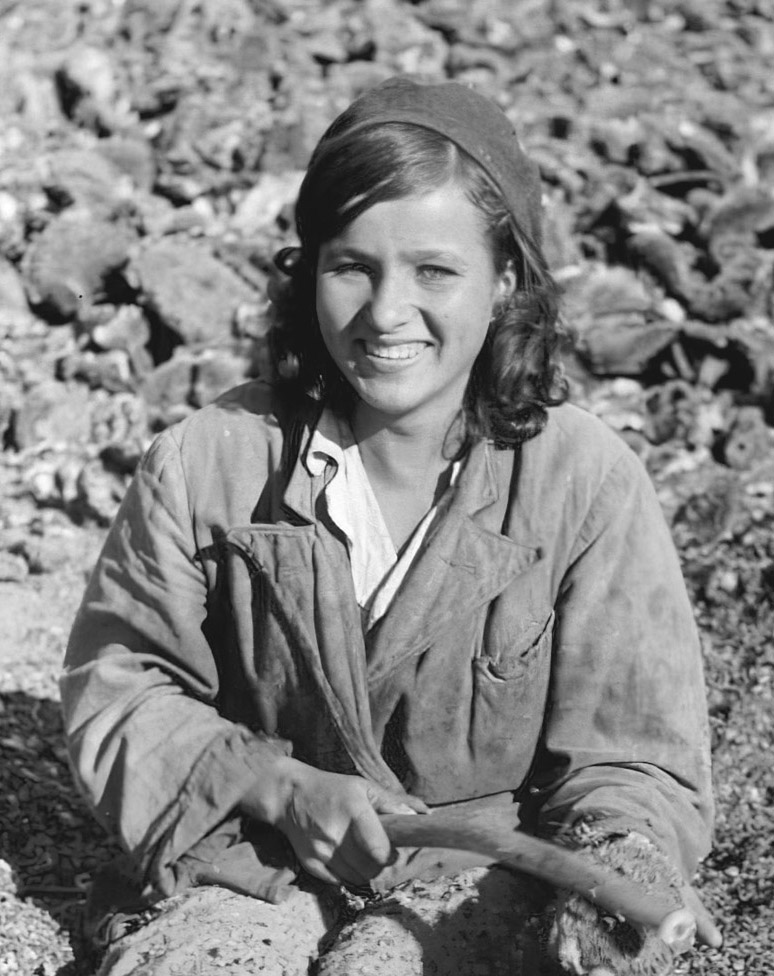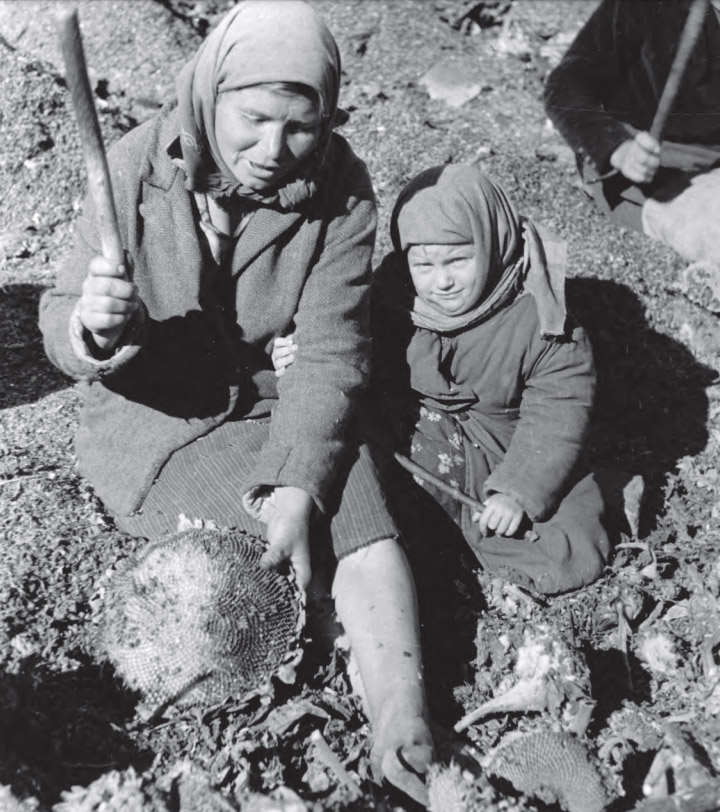

Interview with Ursula H., a BDM girl who worked with Ukrainian farmers for the 1942 harvest. Nuremberg, 1983.


Interview with Ursula H., a BDM girl who worked with Ukrainian farmers for the 1942 harvest. Nuremberg, 1983.
You are a friend of my Aunt Inge, can I ask how you met?
Ursula: Yes, I met her at school in 1948. We had class together and sat beside each other. We found out we had much in common and became friends. My family died during a terror raid on Mannheim. It was lucky for me that I was away at the time; all young people were sent away from cities to make sure the young stayed safe.
When I found out, I was in a BDM camp where we were helping with the war effort for the homeland. When my parents died I was made a ward of the BDM and given money to attend school. I liked plants and farming so that was my field of study, botany.
After the war I was able to keep up my studies, and finished in 1952.
What was it like being in the BDM?
Ursula: Oh it was lovely I have to say. I was admitted in when I was 10 years old. It was just a group for young girls, nothing more. We met usually once a week to discuss life, and to plan weekend projects. These could be serving in a church, cleaning up around town, or having craft fairs.
We also did a lot outdoor activities, which is very important for health and we learned to eat healthy. We would have cooking classes along with training in career fields. Oh, and we exercised a lot, and I mean a lot. It seemed every chance we had our leader was making us do calisthenics and running.
It was all for a good purpose but at times we hated it I can tell you. Overall it was a very good experience for me; it built up my self esteem, and gave good peer support. We were taught to rely on each other, and to be faithful and never back bite one another. Our leader did not tolerate any gossiping or bullying.
Something that was important back then in National Socialist Germany was to show everyone we were all equal to one another. In past times there was class divide, which the Communists tried to exploit, so National Socialism wanted to end it. We had girls from all walks of life, from the very poor, to the rich, to the royal.
We were all shown that our worth is not how much money we had, but how valuable we were to our people. An example given, I remember, were seeds sown in a field that all grow up to benefit the whole of society, there is not one seed better than the other. Now some may grow bigger and faster than others, but in the end the purpose is to benefit the whole.
That was taught to us often, that we may be individuals with our own personalities and strengths, but in the end we must benefit the whole of the society we live in. In that way we all have a worthy life, free from worry and want.
We would go help out at soup kitchens, hospitals, and asylums to bring that message to those who may be down on their luck. So you see, to be in the BDM was an honor and in this we served our people and nation. I surely miss those days, and we need a group like that here today.
Some of the young I see are a disappointment and a scourge on society. There is no honor, no love, and no humility shown in this generation. Make sure you do not turn out like that, always be an honorable young man.

[Above: A Ukrainian girl employed by the Germans.]
I am told you worked in Russia during the war, what was that like?
Ursula: Well, not so really. I was part of a group from the BDM who were recruited to go to western Ukraine and help with the 1942 harvest. The east government was still trying to get the food situation organized so they called for workers to come help. We were sent to a farming area around a town called Kovel, we had to pass through Lublin, in Poland to get there.
I remember seeing many Jews in Lublin, some with weapons, it was a reminder there was a war going on. We were sent to Kovel as it was far from the front, and safe. The people were very glad to have help. We stayed on a large farm that had been left abandoned; rumor was the land owner was killed by retreating Soviets.
The fields were sowed with the help of Polish farmers, who were paid to watch the crops. We were brought in to help harvest the wheat, so we stayed from September to November of 1942. It was a nice getaway for many of us, we had a lot of free time to relax and enjoy the land. There was a river we took small boats on to enjoy nature.
How did the people seem to be treated, I have read they were treated as slaves.
Ursula: That is not true, and while I was only there for a few months, I can say they all seemed happy and relieved to be done with Stalin. I hardly ever saw any German military people; it was mostly their own police and armed forces I saw. We had a Ukrainian helper who spoke broken German, and from what I remember she was happy that Germany freed them.
I know there was a food crisis, and shipments had to come in from all over to help. I must tell you we did not cause this; it was Stalin who had burned everything when his army retreated. They burned cities and towns, destroyed farm fields, and poisoned wells. I saw all of this myself.
He was trying to deny German soldiers shelter and food, but it hurt the civilians and then we had to care for them. I must say they were very hard-working and resilient. They were determined to rebuild, and they raised armies to help us. My father was called to duty in 1943, and I remember him saying how many foreign units there were.
I saw Ukrainian soldiers while I was there; they were doing drills and marching. From what I could tell everyone seemed like life was back to normal for them, I saw no real hint of war.
There was a theater in Kovel that was hastily built, that way people could watch shows and go to enjoy quiet time. Something I was told from our helper, her name I think was Nina, was that churches could once more be attended. She told us they were deeply religious, and the Bolsheviks took that from them. She said they killed the priests, seized churches, and forbade Christians from assembling.
She told us one of the first acts German forces did was allow services to be held to thank God for the new freedom. This meant a lot to her and her people. We took it for granted in Germany, under Hitler our churches were renewed and rebuilt. In Kovel there was a church that was made a pig farm under Stalin, it was made sacred again.
And so, do not believe everything you read as the Soviets have told a very false version of history. I have heard Stalin killed off many of those who welcomed Germans, and then he blamed their deaths on Hitler. Making people believe Germans came to enslave and kill off anyone in the east. It makes for a good cover story as to why so many people disappeared after the war.
Something I will tell you as well, my father was in the east from 1943-1944. He told us the partisans also killed many Russians behind the lines. Anyone who cooperated with Germans was targeted, in this way they could make it look like Germans were killing the people. They then spread false propaganda to get people to join them.
The lies they told inflamed those who did not know the truth, and caused them to commit horrible acts upon innocent people. Special units had to be created just to fight them, and it was very bad I was told. I have heard even the children were made to fight, and killed many German soldiers who could not bear to shoot back at them.
I hate to say it but I understand many of the partisans were Jews who had been sent west by Stalin. They worked with others behind the lines to fight for Stalin and the Bolsheviks; you know this was their creation. All of the leaders of the early party were Jews, so they came to fight to defend this idea.

[Above: A Ukrainian woman with her child harvesting sunflower seeds. To this day the Ukraine is one of the world's largest exporter of sunflower seeds/oil.]
How did the war end for you?
Ursula: Well, I stayed with the BDM for the rest of the war. All children were sent away to the countryside to be kept safe. I was sent to a camp in Travemunde, on the coast. We were housed with people willing to take us in. In the summer we could camp out around the area.
It was strangely fun, we had campfires, we could take boats out, we had sporting events, and put on fashion shows. There were other camps nearby as well. The boys and girls were mostly separated as we had different tasks. The boys did heavier work like digging ditches and moving wood.
We had girl tasks like cleaning up areas and sprucing up the town. The boys would try to play pranks on us but they usually got caught and received extra chores. I remember we did sneak out one night and put chalk drawings in front of their area making fun of them.
Our leaders thought it was quite funny, but said if they canít do it, then neither could we, and asked we not be sneaky again. Oh, I remember parents could come up to visit and I last saw mine right before the bombing raid. My father was home from being wounded, and they could not make it to a shelter I was told. I was informed a week after they returned home from visiting me. Bombers had hit Mannheim, and killed many civilians, this was 1944. They said they were trying to hit factories, but the factories were far away from our home.
I have learned they wanted to kill as many civilians as possible so they bombed without aiming at anything. I was given permission to go to the wake, and my leaders sent me with an honor escort to help me mourn. Our priest sent me a letter and a person from the church who knew my parents came up to escort me as well.
It was a hard time for me, as I did not understand the war, and only wanted it to be over. I was kept in the BDM as a ward until it was over. I was in an area where the British came in 1945, and I was 15 then. I was told to never be left alone, and always seek protection in numbers. Many of the girls were collected by their parents; my leader took me with her to a relative's home in a town called Buchen.
I was able to stay with them and not be turned over to the Red Cross. In 1946 they tracked down a relative who was able to take me in so I moved to Erlangen and was able to settle down. That was when I was able to finish school and start college in 1948.
Can I ask if you saw any mistreatment of Jews or concentration camps?
Ursula: Oh no, we had nothing to do with any of that. The BDM was just a girl's organization, we even had Jews in our ranks I have been told. I just do not understand all that was said after the war. In school we were told Jews had used money to buy power and influence in the Reich, and Hitler stopped them.
I know in Mannheim there were Jews who were removed from big positions, there was a newspaper my father worked at, and he said all the high leaders were Jews. The state took away all their authority and gave it to Germans. There was a scandal I remember also where a Jew was caught being a church leader and trying to pass pro-Marxist policies for the church.
There was talk of Jews who had fled Germany in 1933 to get away from charges relating to stealing, lewd behavior, and other crimes. In school they would talk about how Jews claimed to be German but tried to destroy Germany. I never met one until after the war; we had a girl in school that fled with her parents to Switzerland.
She was very quiet and rarely talked, I remember most of us wanted nothing to do with her, we were afraid she would spy on us. We had a former communist as a professor, and he often spoke about the plight of those who opposed Hitler. It felt like we were being preached to, in a biology class.
So you know, I really had nothing against Jews, if they had unfair control of Germany then they should have been removed. I have to tell you I do not believe what they said happened to them in the camps. I think they are lying about the gassing and mass killings. I have met too many people who were there who said nothing of the sort was happening.
As a matter of fact we have a friend in Rothenberg who was a cook at Mauthausen and said they received very good treatment, and they lie when they say they were abused. So who knows, I was not there so I can not say, but I feel most of their stories are lies.